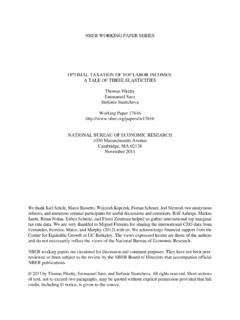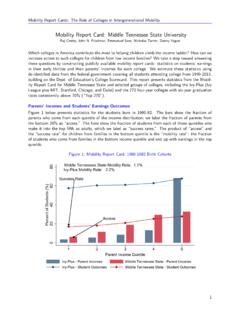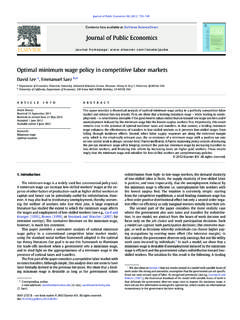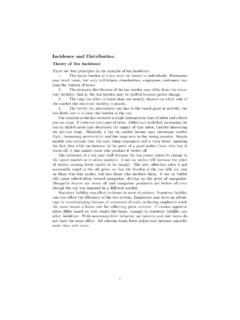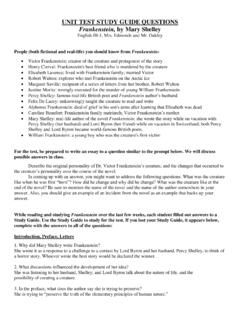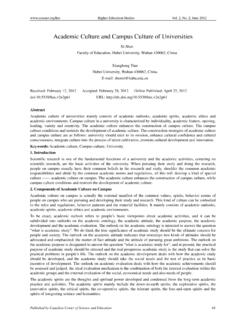Transcription of Understanding the Individualism-Collectivism Cleavage and ...
1 Understanding the Individualism-Collectivism Cleavage and its Effects: Lessons from Cultural Psychology. Yuriy Gorodnichenko Gerard Roland University of California, Berkeley and NBER University of California, Berkeley and CEPR. Abstract: In this paper, we survey our recent work showing theoretically and empirically a link between individualist culture on one hand and long run growth and innovation. The Individualism-Collectivism cultural dimension is the only one that has a robust effect on measures of long run growth. We survey the cross-cultural psychology culture that finds that the Individualism-Collectivism Cleavage is also the most important one in that literature.
2 We discuss some of the implications of the lessons from the psychology literature on the economic and institutional effects of the Individualism-Collectivism Cleavage . 0. 1. Introduction The central role of culture on economic development has been recognized at least since Max Weber who, in his classical work The Protestant Ethic and the Spirit of Capitalism, argued that the protestant ethic of Calvinism was a very powerful force behind the development of capitalism in its early phases. Recently economic historians such as Landes (1998) and Mokyr (2010) have emphasized the crucial role of culture in explaining the industrial revolution.
3 Culture is now commonly defined as the set of values and beliefs people have about how the world (both nature and society) works as well as the norms of behavior derived from that set of values. Given that definition, culture is considered to affect not only social norms but also economic behavior such as the propensity to save or to innovate, fertility choices, labor supply decisions, investment in education, charitable contributions or the willingness to contribute to public goods. Culture is directly related to institutions in the sense that culture, like formal political or legal institutions as defined by North (1990), imposes constraints on individual behavior.
4 Much recent work on culture has emphasized the contrast between generalized and limited morality (see Tabellini, 2008). Generalized morality means that individuals support a set of social norms that are valid for all citizens in a given society, without excluding any particular group of people. Generalized morality is based implicitly on the notion that all humans have equal rights and duties and share a set of universal values. Limited morality in contrast views given norms of morality valid only within a given group such as the extended family, the clan or the tribe. When interacting with people outside one's extended family, these social norms do not apply and opportunistic and amoral behavior is considered morally acceptable and justified.
5 The notion of limited morality goes back to the notion of amoral familism coined by Banfield (1958) in his study of life in a village in Southern Italy where he was struck that notions of good and bad applied only within the family but not in relation to those outside the family. The empirical measure of generalized morality used in the literature (see in particular Tabellini, 2008, 1. Glaeser et al. 2000; Guiso et al. 2006, 2008 and 2009; Grosjean, 2009) is the question on generalized trust from the World Values Survey and other similar surveys where people are asked Generally speaking, would you say that most people can be trusted or that you can't be too careful in dealing with people?
6 High levels of trust are also associated with social capital and an active civil society characterized by active participation of citizens in all sorts of associations (Putnam, 1993; Knack and Keefer, 1997;. Uslaner, 2005). In recent work (Gorodnichenko and Roland, 2010 and 2011) we found that the individualism- collectivism cultural dimension has an important and robust causal effect on innovation and long run growth. We also found that other cultural dimensions not correlated with individualism and collectivism have no robust effect on long run growth. The question is thus how important the dimension of individualism and collectivism may be as a cultural dimension.
7 There is a large literature in cultural psychology addressing that question and we will try to connect this literature to our research and more broadly to economics. Interestingly, the Individualism-Collectivism Cleavage is considered the single most fruitful dimension in cross-cultural psychology (Heine, 2008, 2010, Oyserman et al. 2002). In this paper, we present our findings on individualism, culture, innovation and growth. We survey some of the literature in cultural psychology showing the importance of the Individualism-Collectivism cultural dimension and discuss some of its possible economic implications.
8 2. Individualism and Collectivism. How does one define individualism and collectivism? Broadly defined, individualism emphasizes personal freedom and achievement. Individualist culture therefore awards social status to personal accomplishments such as important discoveries, innovations, great artistic or humanitarian achievements and all actions that make an individual stand out. Collectivism, in contrast emphasizes embeddedness of individuals in a larger group. It encourages conformity and discourages individuals from dissenting and standing out. Platteau (2000) for example illustrates collective culture in the context of African 2.
9 development . Specifically, he documents that productive individuals are seen with suspicion and are coaxed into sharing their surplus with the community. Collective punishments exist to penalize the rich. They take the form of social ostracism, loss of status, or even violence. Communities have for example frequently used accusations of witchcraft to punish greed and acquisitiveness as well as aspirations to move to other places. Behind these punishments is the fear that the community's cohesiveness will be undermined and that an individual who proves more successful will leave the village or will not redistribute any surplus food or production.
10 Baland et al. (2007), Comola and Fafchamps (2010) and Jakiela and Ozier (2011) show how, in African villages, people who have accumulated some savings want to keep this information hidden from others and are even willing to pay to keep their savings hidden from others in their community. The best known international measure of individualism and collectivism is that developed by Hofstede (2001) who used surveys of IBM employees in about 30 countries. The idea was to survey people with equivalent jobs in different countries in the same company so as to measure cultural differences. To avoid cultural biases in the way questions are framed, the translation of the survey into local languages was done by a team of English and local language speakers.

